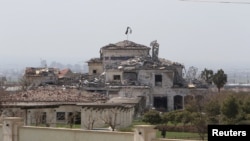The United States condemned “in the strongest terms” Iran’s recent attack on the Kurdistan Region of Iraq. Iran’s Islamic Revolutionary Guard Corps openly acknowledged responsibility for the attack, claiming its targets were Israeli “strategic centers.”
U.S. National Security Advisor Jake Sullivan said in a statement that the attack occurred “without any justification. The United States,” he wrote, “stands with Prime Minister Kadhimi and the leaders of the Kurdistan Region, President Nechirvan Barzani and Prime Minister Masrour Barzani, in condemning this assault on the sovereignty of Iraq and its Kurdistan region. We will support the Government of Iraq in holding Iran accountable.”
In recent testimony before the U.S. Senate, General Kenneth McKenzie, Commander of the United States Central Command, said, “Iran continues to pose the greatest threat to U.S. interests and the security of the [Middle East] region as a whole.” He noted that through its proxies and clients, Iran is fomenting conflict from Yemen through the Arabian Peninsula across Iraq and Syria into Lebanon. General McKenzie also voiced concern “about the remarkable growth in number and efficiency of [Iran’s] ballistic missile force, their UAV program, their long-range drones, and their land attack cruise missile program.”
State Department Spokesperson Ned Price said Iran’s destabilizing activities across a range of realms, including the recent missile attack on Iraq, show clearly why a mutual return by Iran and the United States to the Iran nuclear deal, the Joint Comprehensive Plan of Action, is both desirable and urgent. “Every challenge that we face and would face from Iran – whether that is its support for proxies, its support for terrorist groups, its ballistic missile program,” he said, “would be all the more difficult to confront if Iran were in the possession of a nuclear weapon.”
The United States believes, said Spokesperson Price, that “through a mutual return to compliance with the JCPOA, we can reimpose the permanent, verifiable limits on Iran’s nuclear program to see to it that Iran is never able to acquire a nuclear weapon.”
“The first thing we want to do is put Iran’s nuclear program back in a box, to take that challenge off the table,” he declared, “so that, working with allies and partners we can...take on the challenge that Iran poses in these other realms more effectively.”














